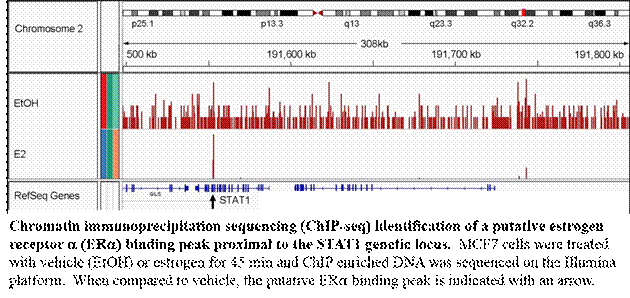Session Information
Session Type: Abstract Submissions (ACR)
Background/Purpose: Many autoimmune disorders, including Systemic Lupus Erythematosus (SLE) display female gender predominance. Previous studies have demonstrated significant hormonal contributions to SLE pathogenesis, including estrogen, which influences gene expression by binding to estrogen receptors (ERα and ERβ). E2 has been shown to regulate Signal Transducer and Activator of Transcription (STAT) 1 function and we have previously defined E2-mediated Toll-like receptor 8 (TLR8) expression in SLE. This study examined E2-induced STAT1 expression human peripheral blood mononuclear cells (PBMCs) and characterized the downstream effect on TLR8 expression.
Methods: Putative ERα binding sites in the human genome were identified from ChIP-seq data of MCF-7 cells stimulated with E2 for one hour. SLE patients and healthy controls were recruited for this study through approved IRB protocols. PBMCs were isolated and stimulated with a physiological dose of 17-b estradiol (E2). Radio-labeled probes were used in EMSA analysis to examine DNA-protein complex formation with recombinant ERα and in a human monocytic cell line (THP-1). STAT1 expression was blocked by siRNA with E2 treatment in THP-1 cells.
Results: ChIP-seq data identified an intragenic ERα binding peak within the STAT1 locus and EMSA analysis using this DNA sequence with recombinant ERα protein demonstrated enhanced DNA-protein complex formation. Levels of STAT1 were significantly elevated in SLE patients relative to healthy controls and E2 stimulation of both SLE and healthy PBMCs significantly induced STAT1 expression. In THP-1 cells, blocking STAT1 with siRNA significantly reduced TLR8 induction by E2. Using a bona fide STAT1 binding region located 24 kb from the 3’end of the TRL8 genetic locus, EMSA analysis showed enhanced DNA-protein complex formation with E2 stimulation in THP-1 cells.
Conclusion: E2 stimulates the expression of STAT1 in PBMCs, which could contribute to SLE pathogenesis by promoting TLR8 expression. These results identify a novel molecular target to inhibit the TLR8 inflammatory pathway; thus presenting a significant therapeutic opportunity.
 |
Disclosure:
N. Young,
None;
G. Valiente,
None;
L. C. Wu,
None;
M. Bruss,
None;
S. Ardoin,
None;
C. Burd,
None;
W. N. Jarjour,
None.
« Back to 2014 ACR/ARHP Annual Meeting
ACR Meeting Abstracts - https://acrabstracts.org/abstract/estrogen-mediated-stat1-activation-by-estrogen-receptor-a-induces-tlr8-expression-a-novel-pathogenic-mechanism-in-systemic-lupus-erythematosus/
